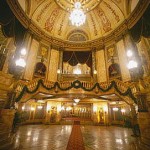Bob Ellis’ Rough Cut: An excellent Syd Film Fest
We are forbidden urination after a three-hour film and herded bursting out into the rain and pushed in front of speeding traffic by big Tongan guardians of the Red Carpet while inside, in the ever-gorgeous art-deco foyer, barmen and pie vendors gazed on its lovely emptiness planning their bankruptcies and other careers and cursing, like all of us, the Clare Stewart Effect on world cinema.
 Audiences entering successive sessions without hellish incident these last 113 years have not educated this woman; clamour, ticketless offices, caffeine deprivation, pissed trousers and lack of a chance to chat between sessions (or even sit on the marble steps) have characterised her Cromwellian rule for years now and several deaths, I calculate, from the pelting rain and it is wrong for her to preen her ghastly dress sense in golden spotlight just because certain films from overseas arrived in her projection box on time and in focus once a year. It is no great shakes as an achievement; the Dendy does it once a week and admits without incident its festival mobs with eased bladders into its masterpieces without riot, affray or altercation while up at the State incensed multitudes baying for coffee, admission and conversation push like revolutionaries at the gate of the Bastille in vain, always in vain.
Audiences entering successive sessions without hellish incident these last 113 years have not educated this woman; clamour, ticketless offices, caffeine deprivation, pissed trousers and lack of a chance to chat between sessions (or even sit on the marble steps) have characterised her Cromwellian rule for years now and several deaths, I calculate, from the pelting rain and it is wrong for her to preen her ghastly dress sense in golden spotlight just because certain films from overseas arrived in her projection box on time and in focus once a year. It is no great shakes as an achievement; the Dendy does it once a week and admits without incident its festival mobs with eased bladders into its masterpieces without riot, affray or altercation while up at the State incensed multitudes baying for coffee, admission and conversation push like revolutionaries at the gate of the Bastille in vain, always in vain.
As usual, though, many films were excellent and some great. A documentary on Glenn Gould, chronicling his growing cantankerous madness in public, private and self-directed footage heretofore unseen. A documentary on Joan Rivers and her efforts to find work as a foul-mouthed cabaret strumpet-comic in her seventy-fifth year. A documentary on Dan Ellsberg, the principled Washington bureaucrat whose revelation of the Pentagon Papers drove Nixon out of office and wrecked forever America’s trust in its rulers, including an audiotape of Nixon proposing to nuke Vietnam and Kissinger wincing. ‘Think big, Henry,’ the drunken First Magistrate raucously jokes, or does he.


Hey Bob, Maybe it’s time to get off the slow train and into the 21st century cinema and festival going experience!
You seem strongly in favour the personal attack! What has she ever done to you, pray? Perhaps you’d like to declare the reason for your vitriol – or do you just feel entitled to publicly (and if I may add, incoherently) savage any individual who may randomly draw your ire??
Bob points to a divergence of interest: a closebound set of film-awares and a vast potential of single sessioneers. The first need facilities and conversation places, the second need flashbulbs popping.
The State suits the first, somewhat magnificently and potentially as a world destination (assuming publicity could start at a sensible time). The Art Gallery even more a classic venue. The Event place offers little of style itself and the surroundings are bleak in winter. The Dendy a nice enough modern-day art house but in no way exceptional as a place to visit, again bleak in winter. Does the Festival need to abandon the film-awares in its pursuit of the flash popping? Given proper planning, no, the Festival could have both.
Already the Opening Night is a month past, the next Opening only eleven months away. Can the new organisation shape up in time to meet the demands of both audiences? Time will tell.
heinous though the stewart wardrobe may be, nothing is more tiresome during a film festival as hearing patrons complain about waiting in queues. not even the waiting in queues itself. especially if the complainants are: a) old; and: b) self-entitled.
Bob, you stay on ‘the slow train’ and keep up the ‘personal attacks’ when and where deserved. But then, I need not tell you that. For as if you would ever listen to X & Y Generation upstarts and their “Oh, it’s really such a lovely world” diatribes.
Writing in the context of modern films, and viewing only scraps of CT, Bob is right to compare with Randolph Scott (and what could be wrong with THAT??) which is precisely what the makers thought they might find a market for. The point is to have the film found and thus judged as it should be seen, with credit to the director and other fine if inexperienced contributors.
Yes, the episode from Three In One is slight, was thought to be so at the time, clearly was lesser run up to make a feature film. And its sentimentality is so mild compared with the guff at the dozens on (then) Sydney cinemas including the State. So Cecil Holmes was not Douglas Sirk. We at the Art Gallery all got to see skilful filmmaking in a film which has NEVER been shown in a regular city cinema (in Melbourne, it got some run at the old and decrepit Dendy at Brighton after quite a delay).
These films were not offered in competition with current films. They did give us insights into a then-bleak period of Sydney film making. We await the re-discovery some day somehow of Captain Thunderbolt, a young man’s bold effort.